
![]() The Chaos Function by Jack Skillingstead
The Chaos Function by Jack Skillingstead
Jack Skillingstead’s latest novel, The Chaos Function (2019), has a fairly straightforward premise: a young journalist accidentally receives the ability to shift reality from one possible timeline to another, though not without disastrous consequences. The first time she performs this shift, it’s purely by accident, though that doesn’t make the new future any less grave. Each time she shifts to another possible timeline without returning to the original, the consequences become more and more dire, until she is left with a terrible choice: return reality to its intended course or watch the entire world destroy itself.
At its heart, it’s a gripping conceit, and watching the various permutations of reality spin farther and farther out of control was enough to keep me turning the pages to see how things could possibly become more dire. What starts as an awful enough scenario on its face — civil war in Syria, still going on in the year 2029 — escalates from a variola (smallpox) outbreak to an even more deadly variola pandemic to all-out nuclear war, each of which results from Olivia Nikitas’ attempts to reset events back to a crucial moment in an Aleppo madrassa, before a metallic insectoid thing flew out of a tortured old man’s corpse and buried itself in her scalp.
The old man, it turns out, was part of a secret society (known as “the Society”) and led it as their Shepherd, using the Society’s millennia of access to mysterious technology in order to guide global culture and economics during the path that the Society feels is best. Shepherds are exclusively male, and groom their successors over the course of decades to ensure that the Society’s vision is upheld, though there are disagreements and factions within the Society over whose vision is the most correct. When Olivia unintentionally becomes the Shepherd, it throws everything into disarray, and after kidnapping her and confining her in their walled-off Idaho compound, the easiest solution to her disruption is to kill her and let an ordained Shepherd take over, setting the world back on course.
And what, you may ask, does Olivia do which throws the entire globe into peril? Her kinda-boyfriend Brian is shot outside the madrassa, and when he dies, her earnest wish that he hadn’t is fulfilled by the Society’s technological wonder. Brian comes back to life, and in exchange, the world’s population is engulfed in smallpox lesions and, later, after Olivia keeps returning to that moment in time to try to find a way to keep him alive, nuclear hellfire. Being the Shepherd, Olivia is the only one who remembers the previous timelines, so each change she makes creates double- and triple-layers of memory for her even though everyone else accepts their reality and its permutations without recalling any previous timelines. It’s all part and parcel of chaos theory and the butterfly effect, exploring the concept that even minute changes can have unforeseen and massive results, and that aspect of The Chaos Function was fascinating.
However, I couldn’t buy into Olivia’s rationale for her actions. She and Brian have only known each other for a short time, he’s got a steady girlfriend back in Seattle, and Olivia has serious trust and intimacy issues — all of which, compounded, meant that I couldn’t understand her stone-headed insistence that the entire world was worth wrecking, over and over again, so that this one guy she maybe-loves could keep breathing. Olivia’s complicated backstory informs the rest of her character well, and her reluctance to embrace anything beyond friendship or superficial romantic entanglements comes from an honest place, but her sudden and intense attachment to a sweet NGO worker who she brings back to life and then spends a lot of time trying to emotionally distance herself from while he’s helping her drive to Chicago and back, fleeing Society members and seeking answers, doesn’t work. If I’d had any sense that the relationship between Olivia and Brian was more than just a stress-relieving wartime fling, her refusal to live in a world without him would have helped everything else click together much more seamlessly.
Additionally, Skillingstead focuses too much and too often on the minutiae of what a character is wearing or eating, or the set-dressing of a scene, like how many coffee cups a waitress sets down and where she places them, all of which tended to distract me from what should have been a taut, propulsive narrative. A key character’s repeated refusals to answer any of Olivia’s questions about what her strange new power is or how she can effectively implement it quickly became tiresome, as did the many times Olivia is imprisoned and bound by captors with no reasonable means of escape, and the Society members’ continuous exhortations that none of what she’s doing should be possible strictly due to her gender.
It was too hard for me to shut off my brain and enjoy The Chaos Function purely for entertainment’s sake, though the philosophical and political theories Skillingstead plays around with are compelling and thought-provoking. Despite the potentially heavy subject matter, I think this would be a good vacation read, especially if one is traveling long distances and needs to fill substantial chunks of time.



I felt just the same. The prose and character work was excellent. The larger story was unsatisfying, especially compared to…
Hmmm. I think I'll pass.
COMMENT Was I hinting that? I wasn't aware of it. But now that you mention it.... 🤔
So it sounds like you're hinting Fox may have had three or so different incomplete stories that he stitched together,…
It's hardly a private conversation, Becky. You're welcome to add your 2 cents anytime!